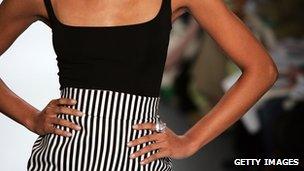School children need body image lessons - MPs
- Published
- comments

MPs released the Reflections on Body Image report after a three-month inquiry
All school children should take part in compulsory body image and self-esteem lessons, MPs have recommended.
It comes after an inquiry by the All Party Parliamentary Group on body image heard evidence that more than half of the public has a negative body image.
Girls as young as five now worry about how they look, the MPs' report said, while cosmetic surgery rates have increased by nearly 20% since 2008.
Media images of unrealistic bodies were said to be largely to blame, they said.
The MPs released the <link> <caption>Reflections on Body Image report</caption> <url href="http://bodyimage.org.uk/news/body-image-report-launched" platform="highweb"/> </link> after a three-month inquiry, involving an online consultation and oral evidence given to the cross-party group.
<bold>Appearance-related discrimination</bold>
Among other recommendations was a review into whether the <link> <caption>Equality Act 2010</caption> <url href="http://www.legislation.gov.uk/ukpga/2010/15/contents" platform="highweb"/> </link> should be amended to include appearance-related discrimination, which would be put on the same legal basis as race and sexual discrimination.
Jo Swinson MP says 1.6m people in Britain are suffering from eating disorders
Under the current act, people can be prosecuted for verbal abuse if it is considered to be serious enough.
If this was amended it would be a offence to harass someone because of their appearance, for example by drawing attention to their weight.
APPG chairwoman, Jo Swinson MP, said there was a "definite problem" with body image and that has "serious consequences".
"It's something which has existed for a long time... but in terms of the scale of it, that is what is new, and it is being driven by the proliferation of media imagery portraying a so-called 'perfected ideal' that is entirely unattainable for the vast majority of people," she told BBC Radio 4's Today Programme.
'Major barrier'
The inquiry found evidence that suggested body dissatisfaction in the UK was on the rise.
It is a key factor in health and relationship problems and low-self esteem, the report, co-authored by health and education charity Central YMCA, said.
The report suggested it is also a major block to progression at school and work.
Children often reflected their parents' own body-related anxieties, the evidence suggested, while appearance is the greatest cause of bullying in schools.
Body dissatisfaction, the report said, is a problem that affects people regardless of age, gender, sexuality, ethnicity, disability, body size or shape.
However, the evidence suggested young people and children were particularly vulnerable to anxiety over their bodies.
Parents were one of the main influences on children - but peer groups became a stronger influence by secondary school age.
About half of girls and up to a third of boys have dieted to lose weight, the report said.
More than half of British people have a negative body image, a study by the Centre for Appearance Research at the University of the West of England, quoted by the report, found.
Eating disorders
The inquiry - which heard from academics, magazine editors, company chief executives, the public, and other experts - also heard that:
Wiping out dieting could stop 70% of eating disorders
More than 95% of people on diets regain the weight they lose
1.6 million people in the UK have eating disorders
Up to one in five cosmetic surgery patients could suffer from body dysmorphic disorder
One in three men would sacrifice a year of life to achieve their ideal body
One in five people have been victimised because of their weight
The report made a series of recommendations, including:
The need for mandatory body image and self-esteem lessons for children at primary and secondary school
Requiring advertisers to run long-term campaigns that reflect consumer desire for "authenticity and diversity"
Using "weight-neutral" language for public health messages
Reviewing broadcast and editorial guidelines on reporting on body-image issues
Reviewing the evidence base that supports dieting
Creating a new set of regulations controlling cosmetic surgery advertising
Introducing screening for potential cosmetic surgery patients
The possible amending of the Equality Act to include appearance-related discrimination
Ms Swinson told the BBC the media and companies should take "positive steps to show a greater diversity and authenticity in the images we are bombarded with on a daily basis".
The Lib Dem MP for East Dunbartonshire also said a form of kite-marking as a reward for organisations that take action would be welcome.
Central YMCA chief executive Rosi Prescott said: "It is clear there is something seriously wrong in society when children as young as five are worrying about their appearance."
The inquiry was conducted between 24 November 2011 and 24 February 2012.
It consisted of an online consultation and 10 evidence sessions where witnesses representing organisations with an interest or association with body image gave evidence at the House of Commons. In total, the online consultation had 601 submissions.
- Published11 May 2012
- Published6 January 2012